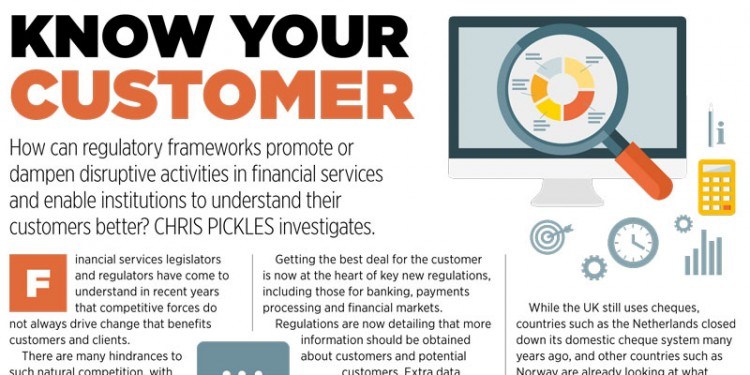How can regulatory frameworks promote or dampen disruptive activities in financial services and enable institutions to understand their customers better? Chris Pickles investigates.
Financial services legislators and regulators have come to understand in recent years that competitive forces do not always drive change that benefits customers and clients.
There are many hindrances to such natural competition, with some legacy internal systems being decades-old and many inter-party utilities and services being slow and outdated.
The global market crash of 2008 highlighted many existing issues that individual financial institutions cannot address on their own. As a consequence, rather than new regulations in the EU being conservative or retaining the status quo, they have instead become the primary generators of change and disruption across the financial services sector.
DISRUPTIVE CHANGE
National governments (such as those of the G-20 countries) as well as regulators nationally and internationally have set out to create disruptive change. This is designed to reduce unnecessary risks in the market and generate competition in the interest of customers.
Getting the best deal for the customer is now at the heart of key new regulations, including those for banking, payments processing and financial markets. Regulations are now detailing that more information should be obtained about customers and potential customers. Extra data is needed to support requirements such as appropriateness tests, so that firms do not try to sell the wrong kind of products to the wrong type of customer.
There are also nationality tests, so that customers who have tax obligations in other countries are pinpointed. A greater amount of KYC (Know Your Customer) validated data is required to establish that the customer is in fact who they say they are, irrespective of whether the financial organisation is dealing with a private individual or a legal entity.
UK INNOVATION
Legislators and regulators have stepped in to change how financial services can be made available. Examples of this have included opening up the payments sector to non-banks, enabling new banks to enter the market and offer niche services, and providing FinTech sandbox environments to help start-up service providers to understand how regulations impact their intended business models.
As the largest international financial centre in the world, London has become a focal point for innovation, and changing regulations are helping companies to develop and evaluate new service models.
While the UK still uses cheques, countries such as the Netherlands closed down its domestic cheque system many years ago, and other countries such as Norway are already looking at what would be involved in removing coins and banknotes as well.
With technological and manufacturing innovation often driven out of the USA and Asia Pac, delivering innovative financial services in a well-regulated environment is a field in which the UK excels. As well as changing its own technology, the UK is helping financial infrastructures around the world to implement new technology for their own domestic markets.
ADOPTING TECHNOLOGY
Introducing new technology into the financial services sector is not usually a plug-and-play swap-over – it requires changes to business processes and workflow management.
The market and regulatory environment and therefore the operational environment vary from country to country for financial institutions. Firms are looking to buy not products but business solutions.
Understanding the business and workflow processes and the regulatory compliance environment are factors that are critical to the successful adoption of innovative technology-based solutions within the financial services sector.
Knowing your customer is just as important for technology innovators as it is for financial institutions – and even more so where these are one and the same.
Please use the download button to view this Argent article in PDF format.

